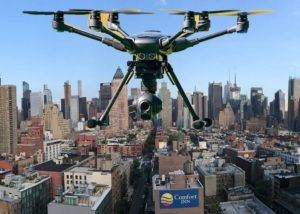Until this past year, consumer drones carried tiny ultralight cameras, but they just didn’t have the energy or the reserve to carry much else. They certainly could not deliver much of a product or payload. They flew for 15 minutes, lacked the capacity to carry excess weight, and had short range.
But market demand sparks innovation. Amazon and Domino’s Pizza are experimenting with drone delivery. The improvements needed to serve these needs are quickly bubbling down to unlicensed weekend pilots. Hexacopters with 4K cameras, gimbals and retracting landing gear are available for under $400. Tiny foldable drones with 720p cameras are available for $35. Some models don’t even need a pilot on a joystick. You can preprogram the flight path to reach any target using GPS, or you can guide them by making gestures with your hand. The drone actually looks back over its shoulder and responds to your hand-waving commands.

Lance Ulanoff is a cartoonist and robotics fantech expert. But he shares a lot in common with Wild Ducks. He is an eclectic journalist and social media commentator.
This month he began publishing at Medium.com, and I’m glad he did! Lance has a knack for going beyond the Who, What, Why. Even in a short article, he explains the social implications. He provokes us to recognize why it matters.
Lance breaks down the recent attempt to assassinate Venezuela’s president with a drone delivered explosive and raises our social antennae. This news event ushers in a grim technology era. Ulanoff points out that in a short time, it has become inexpensive and fairly easy to send an explosive directly into a national monument like the Statue of Liberty.
- Venezuela’s Drone Attack May Not Be the Last
—by Lance Ulanoff
Photos: Venezuela President, Nicolás Maduro, reacts to incoming drone. Although the assassination attempt failed, others on the ground were injured.
Philip Raymond co-chairs CRYPSA, hosts the New York Bitcoin Event and is keynote speaker at Cryptocurrency Conferences. He sits on the New Money Systems board of Lifeboat Foundation and is a top Bitcoin writer at Quora. Book a presentation or consulting engagement.

